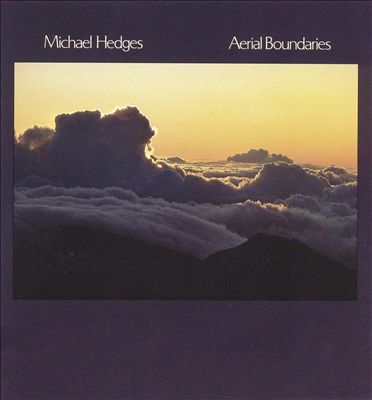
Aerial Boundaries by Michael Hedges (1984)
I really like a lot of music categorized under the
However, this is not the case with Windham Hill artist Michael Hedges, in my view one of the most amazing and accomplished instrumentalist acoustic guitarists of all time. Although it is fair enough to classify him as a New Age artist, such a designation should not keep him from his deserved place among other popular guitarists known for legendary and revolutionary performances on their instrument. During his roughly twenty years of professional playing, he created an extensive catalog of extraordinary recordings that was tragically cut short in 1997 as the consequence of a fatal car accident.
In terms of musical innovation, Hedges is truly on the level with someone like Jimi Hendrix. That may sound like an exaggeration, but upon closer examination, it really isn't. Similar to Hendrix, Hedges made use of reverse recording and feedback, but in the context of a considerably different musical style.
While Eddie Van Halen took the hammer-on guitar technique and made it into one signature aspect of his artistic repertoire, Michael Hedges turned the hammer-on method into a complete approach to his instrument. When you first listen to a Hedges recording, you may find it hard to believe that one human being can get such a rich and complex sound out of one guitar, but if you watch and listen to one of his music videos and see how he plays his instrument, you'll realize how it's done, which won't necessarily make it seem any less astounding to you.
As I see it, Aerial Boundaries is Michael Hedges' best album, but by this I don't mean to say anything negative about his other albums, all of which are worth listening to and buying. I suppose that I prefer Aerial Boundaries because it features an interesting variety of moods and styles, and offers so many solid and compelling compositions. Overall, the album has a distinctly spiritual feel, so if you are someone who wants to get in closer touch with the divine or some other kind of universal force, you might consider Aerial Boundaries to be a type of sonic portal to where you want to go.
The most interesting tracks are the following:
The opening title track is perhaps the one song that most defines Michael Hedges himself, kind of how "Purple Haze" defines Jimi Hendrix. It's pretty much his tour-de-force. Beginning simply with what seems to be an American Indian style of rhythm played with a two-note chord, the tune gradually builds in complexity, first adding a tentative lead melody, then integrating sweeping bass notes. Building on the simple underlying theme, Hedges constructs a swirling and soaring sound space that alternately goes up, swoops, hovers, descends, and rests, similar to the motions of a bird, hence the song title. The song has a kind of power and excitement to it that might describe the sensation of flying in a dream, as if you were to suddenly and spontaneously find yourself doing something that you had previously considered to be fantastically impossible. The artist creates the sensation of immense space and depth by transitioning between clustered bursts of notes and single sustained notes, and by counterbalancing low and high notes.
"Ragamuffin" reminds me a little bit of Led Zeppelin's "Black Mountain Side" since it also has a slight Middle-Eastern feel to it and makes use of the same kind of percussive technique. I don't know if Hedges had the Jimmy Page composition in mind when he did it, but from my perspective, if we consider "Black Mountain Side" to be a kind of musical sketch, "Ragamuffin" is more like a fully developed composition since it features more movements, transitions, and sonic variations.
"Hot Type" is a conceptually interesting piece. Hedges explained that in the early 1980s, he had bought an IBM typewriter that allowed you to first type your text on a small digital screen, then you could press a print button and the typewriter would go about typing out what you had written. Fascinated by the jerky and odd rhythms produced by the device as it auto-typed, Hedges decided to emulate them in an original guitar composition. What I especially like about it is that the organic tone of his wooden acoustic guitar is employed for recreating the sounds of a metallic machine.
"Spare Change" is song that Jimi Hendrix would have undoubtedly liked, since it makes extensive use of reverse recording and feedback. The middle of the song is particularly innovative. Hedges allows the instrumentation to gradually fade away into silence, until we are only left with the pure feedback from his guitar, which slowly and dramatically transitions from one tone to another. It is not the wild, screaming, mind-blowing feedback of Hendrix, but rather something quieter, more meditative and subtle. It's a spiritual song that might be interpreted any number of different ways. I think that "Spare Change" could be used to excellent effect as part of the soundtrack for a movie.
In "Ménage à Trois," Hedges collaborates with other artists, in this case Michael Manning on fretless bass and Mindy Rosenfeld on flute. The combination works well, with each of the musicians taking his or her respective turn with the lead instrumentation. It's a peaceful composition that might bring to mind a solitary walk outdoors on a pleasant autumn day.
If you like instrumental acoustic guitar, this album is a definite must-have for your collection. Also, if you appreciate the playing and recording techniques of Jimmy Page, Jimi Hendrix, and Eddie Van Halen, you may find that Michael Hedges is the perfect introduction to another genre of music.
Reviewed by Somebody Else 12/1/10
See more Favorite Albums of the Moment





